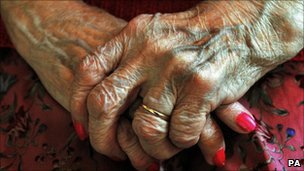Dilnot report: How will we pay for elderly care?
- Published
- comments

The cap could cost the Treasury between £2-3bn a year
Labour paid a heavy political price before the last election for proposing what the Conservatives dubbed a "death tax". Next week the government will be urged to cap the bills people face for caring for the elderly.
The Commission on Funding of Care and Support, to be published next week, will contrast the good news - we're living longer - with the bad - the bills for caring for us are soaring. A quarter of people aged over 65 can expect a bill of over £50,000; for 1 in 10 a bill of over £100,000.
Capping that at, say, £35,000 would mean that people would not risk losing their house or all their savings. The report comes next week but today the Commission's Chairman Andrew Dilnot told me how a cap could work.
The cap would, he hopes, encourage the growth of a range of new financial products - not just care insurance but ways to release equity from people's houses and funds from pension schemes to pay bills up to the cap. The government would pledge to cover the rest.
The cap could cost the Treasury between £2-3bn a year - the same as the cuts to public sector pensions. I'm told that ministers are likely to welcome the report whilst urging those who want to see it implemented to suggest where the money might come from.
The charity Age UK has suggested asking pensioners to pay National Insurance. Other controversial ideas include means-testing disability benefits or domiciliary care. Politics could yet kill this idea too.